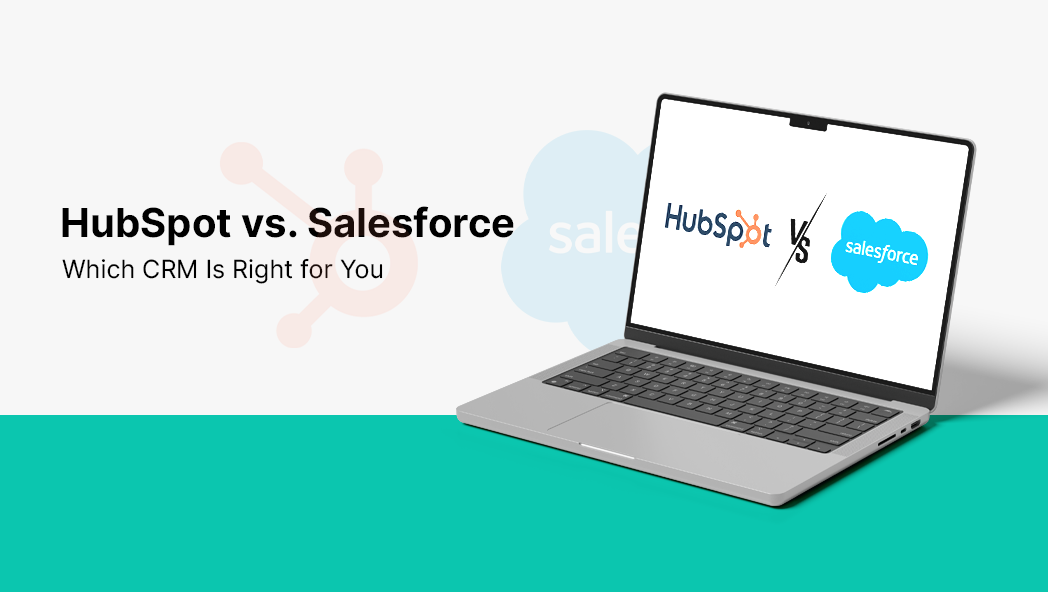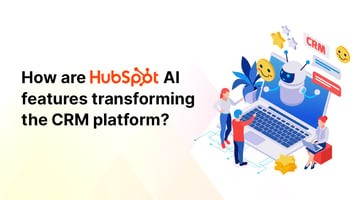Overview We now operate in a world where artificial intelligence is no longer a futuristic concept....
Choosing the right CRM software is key to managing customer relationships, boosting growth, and improving business operations. But with so many options out there, it can be tough to know which one to pick. Two platforms that always stand out are HubSpot and Salesforce. Both are popular platforms used by businesses of all sizes in various industries.
They are known for offering a wide range of tools to help with tasks like managing customer relationships, organizing projects, automating marketing and creating digital systems for teams. But if you are trying to choose between the two, should you just leave it to chance? HubSpot is known for being user-friendly, affordable and packed with great inbound marketing features.
On the other hand, Salesforce is famous for its ability to be customized, its powerful analytics and its features designed for large enterprises. So, how do you figure out which one is best for your business? Continue reading the blog to learn the difference between Hubspot and Salesforce!
Understanding the basics of Salesforce and HubSpot
Both HubSpot CRM and Salesforce offer similar sales tools, but each has its own strengths and weaknesses. Before diving into a detailed comparison across some key areas, here is a brief overview of both platforms:
What is HubSpot CRM?
HubSpot CRM is a top-rated CRM that stands out for offering a free version with key sales and marketing tools. It includes basic features like automation, contact management and email marketing across all plans. As businesses grow, they can upgrade to more advanced tools and stronger workflows.
HubSpot is well-known for being easy to use and providing excellent customer support. It is a great choice for solopreneurs, small businesses and startups looking for a simple CRM solution that is quick to set up and use.
Also Read: Top Challenges in HubSpot Migration and How to Overcome Them
What is Salesforce?
Salesforce Sales Cloud is a strong and highly flexible CRM designed mainly for large companies with complex sales processes. It offers a wide range of advanced sales tools, powerful analytics and plenty of customization options.
Moreover, users can take advantage of its AI features to personalize content, gain insights from various data sources and automate tasks. However, Salesforce can be tricky to use for beginners, and its pricing may be higher than other CRMs, which makes it less ideal for smaller businesses.
HubSpot CRM vs Salesforce CRM: A detailed comparison
Choosing between HubSpot and Salesforce is like picking between a pocket knife and a toolbox. HubSpot is simple, all-in-one and easy to use, perfect for smaller businesses. Salesforce, on the other hand, is like a toolbox with powerful tools that can be customized but take time to master.
Integration
- HubSpot offers clear sales metrics and a set of tools that work well together for a smooth and unified experience.
- Salesforce, built by adding different platforms, can feel less integrated, but it has a large marketplace to add extra tools and features.
Customization
- HubSpot makes customization easy with simple drag-and-drop tools, so anyone can adjust it to fit their needs.
- Salesforce offers much more in-depth customization, but it can be complex and may require technical skills to fully take advantage of.
So, if you want something quick and easy to customize, HubSpot is a better choice. However, if you have the technical resources and need more advanced customization, Salesforce is a great option.
Marketing tools
- HubSpot is well-known for its inbound marketing features like content creation and email marketing, which help you attract and nurture leads.
- Salesforce offers more advanced marketing tools, like Pardot, but may require extra customization to match HubSpot’s ease of use.
Customer support
- HubSpot provides 24/7 email and chat support for all paid plans. Phone support is only available for Professional and Enterprise plans.
- Salesforce offers phone, email, and live chat support during business hours on all plans. For 24/7 support, you will need to pay extra.
Ease of use
- HubSpot is well-loved for its simple, user-friendly interface, which makes it easy for smaller businesses and non-technical users to get started.
- Salesforce offers great customization, but this can make it more complicated for those without technical expertise. It might require extra training to use effectively.
Therefore, if you want a simple and easy-to-use platform, Hubspot is the way to go. However, if you need more advanced features and do not mind spending time learning, Salesforce might be better.
AI tools and features
- HubSpot provides Chat.Spot.ai (Beta), which is integrated with AI tools across most plans. It offers predictive insights, smart recommendations and automation, even on lower-tier plans, with the help of Breeze Copilot.
- Salesforce offers AI tools like Einstein GPT and Einstein Copilot, which help with automation, creating custom AI agents and analytics. These features may depend on the plan or add-ons and might require some setup.
Pricing
- HubSpot offers a free plan and paid plans ranging from $50/month to $450/month. The enterprise version costs $1,200/month, which makes it suitable for businesses of all sizes.
- Salesforce pricing is based on a per-user model, which starts at $25/month per user, up to $300/month per user, with many advanced features.
Salesforce vs HubSpot CRM: Which one is right for you?
Choose Salesforce if:
- You have high customization and automation needs and can handle its advanced features.
- You plan to scale rapidly and need powerful integrations and flexibility.
- You are a large enterprise with a bigger budget and resources to manage complex CRM systems.
Choose HubSpot if:
- You need standard CRM features for sales, marketing, and customer service without heavy customization.
- You need a simple and affordable CRM for a growing business with flexible pricing.
- You are a small or medium-sized business looking for an easy-to-use platform that does not require much technical expertise.
Overall, HubSpot is great for smaller businesses and simple setups, while Salesforce excels in scalability and customization for larger companies.
Final verdict!
Picking the right CRM is more than just choosing a tool- it is about finding a partner to help your business succeed. After comparing Salesforce and HubSpot, it is clear that both have unique features. The key is to figure out which one fits your business best by considering your needs. Think about factors like cost, customization options, features, ease of use, support, and how well the platform can grow with your business.
Salesforce is packed with features and customization options, but it can be more complex and expensive. HubSpot, on the other hand, offers a free plan, but might not have the same level of customization and scalability as Salesforce. Choosing between Salesforce and HubSpot depends on what you need from your CRM.
-1.png?width=134&height=66&name=amwhiz-logo%20(1)-1.png)



